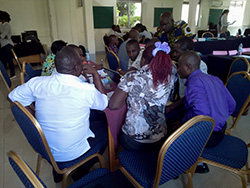N2Africa Uganda Annual Planning was conducted at central Inn Entebbe from 23- 25th January 2017. The workshop brought together representatives from national partner organizations including the NGOs (Africa 2000 Uganda, Agency for Sustainable Rural Transformation, CARD Uganda, World Vision Uganda), research (Makerere University, and the National Agriculture Research Laboratories Kawanda, National Agriculture Crop Resources Research Institutes of NARO), the private sector (Simlaw Seeds and Agrinet, Network for Commercial Farming and Marketing (NECOFAM), Agricultural Innovation Systems Brokerage Association (AGINSBA) -ICT Platform for extension information access (M-Omulimisa) and the Ministry of Agriculture Animal Industry and Fisheries (MAAIF).
|
Image 1. Partners during a group session for joint development of 2017 work plans |
The Uganda project team (IITA Uganda), the Senior Business Development Officer (Edward Baars), and the Coordinator Research and Data (Joost van Heerwaarden) facilitated the workshop. During the workshop, progress made in 2016 was discussed, learning lessons were shared and gaps identified to serve as input for the planning. Progress was made in delivery and dissemination, but gaps still exist in input supply and market access, mainly due to fractured demand and a lack of access to information by value chain actors. The country strategy therefore needs to prioritize the strengthening of information access and to disseminate proven grain legume technologies more widely beyond current project sites. To achieve this, an ICT platform developed by a new partner, Agricultural Innovation Systems Brokerage Association (AGINSBA). In this strategy, input distribution systems established and led by input suppliers and agro-dealers are to be strengthened where opportunities exist, especially for soyabean and common beans. |
New opportunities were also identified (i) to partner with projects from the Ministry of Agriculture Food security and nutrition, particularly with the school feeding programmes. This would be a promising avenue to promote nutritious iron-enriched common beans and institutionalizing dissemination approaches used by the N2Africa project and (II) to collaborate further in the testing and dissemination of promising experimental and released bean varieties from NACCRI’s National bean programme and from CIAT’s TLIII project in Uganda. These opportunities were incorporated in the planning. The planning process continued to embrace the four pillars of the project exit strategy of capacity building, inputs access, dissemination and output market access and nutrition, and some emerging cross cutting issues of gender which were presented b the gender focal person (Berna Twanza, World vision) and the Masters student (Eriya Kuule) conducting research in gender. Draft plans will be further reviewed by the country coordination team and the project ME specialist, Senior BDO and the coordinator researcher data for agreement making with partner and before onset of the commencement of the first season.
Justine Onyinge, Field Liaison Officer, Southwestern Uganda and Peter Ebanyat, Country Coordinator Uganda

